The Star Trek writer from the “golden era” of Next Generation and Deep Space Nine and showrunner of his own successful TV shows returned to Star Trek Las Vegas this year. He spoke on a number of topics including being a showrunner, what makes a good story, the role of social media in today’s TV writing, and of course his time on TNG and DS9.
Star Trek was ready for change after Enterprise
One of the best moments in Moore’s panel came at the end when a fan asked a question about the dreaded concept of Star Trek franchise fatigue.
When you say something like franchise fatigue it means that, to me, it means that particular flavor had run dry, essentially, to mix my metaphors, essentially that way of doing Star Trek, that way of telling story, and those kinds of stories had run its course. You could just see in the shows, it had fatigue, it was tired. It wasn’t really engaging any more or felt like it was just standing in place. Then it gets reinvented, and then you bring in new people, and you bring in new ideas, and you change up the parameters, and then it all gets reinvigorated again. So, it’s not so much about volume, it’s not really about how many shows there are, it’s really about are you able to still engage the audience and make it seem fresh and exciting. Once you’re in the same place and doing the same show time after time after time, which is what the Star Trek franchise started to feel like by the time that Enterprise ended, it just felt all the same and it didn’t feel new. Then it’s time for a big change, then it’s time to go fallow for a while and plant the ground all over again.
The Trek franchise today
Moore continued to address the fan’s concern that perhaps the news that CBS is interested in some form of Trek content on All Access year-round would lead to a new franchise fatigue:
Where you are now it’s like, Okay it’s all been reinvented, it looks completely different, the style is very different, the stories are different, so it doesn’t feel like you’re in danger of franchise fatigue just because there’s a lot of them coming out. If they’re all the same or if they just start becoming the same meal over and over again, then you’ll run into fatigue and they’ll have the same problems.
Piller fostered the writer’s room
Michael Piller was brought in during the third season of Next Generation to lead the writers’ room. His new blood and his willingness to take risks on young writers fostered an environment like no TV show before it. Piller went on to co-create Deep Space Nine and Voyager as well as write Insurrection.
Michael was an extraordinary guy, I’ve never met anyone quite like him. Michael was truly guileless, he really honestly had no agendas, had no secret things he was trying work you, he pretty much told what we told you is how he felt – sometimes you didn’t want hear how he felt. He was a mentor and really cared about bringing up inexperienced people like me, Brannon Braga, René Echevarria and Naren Shankar. Michael mentored all of us and he was always looking for ways to give people an opportunity to succeed. He was a sweet lovely man. He was a character, he always wore his LA Dodgers baseball cap consistently around the office.
Proud Deep Space Nine pushed Trek’s boundaries
After writing the Trek film First Contact with partner Brannon Braga, the two went on to different Trek shows. Moore made his mark on Deep Space Nine, where he stayed until the end of the series.
It’s hard to believe it’s 25 [years old]. That was a tremendous experience. I always think that for me, The Next Generation was like going to college for television writing, and then graduate school was Deep Space Nine.
Our determination on that staff to push the boundaries of Star Trek, to sort of challenge your assumptions of what Trek was and what it was not. To go serial as much as we could, to make the characters more complicated, to have more ambiguous storytelling, to do challenging things. We just really loved it, we kind of felt like “We’re the forgotten step-child of Star Trek and screw everybody else! Someday they’ll love us.”
Moore loves a good surprise
The panel started with a discussion about how Moore writes:
I write from a frankly very selfish place, I write stories I want to see or that engage me. I use my own internal barometer in terms of what I think a good story is. There’s a part of me that’s always imagining sitting at home watching it. If it surprises me, if there’s a twist in a character arc, or I thought the story was going to be about this and it turns out to be about that, that always makes me sit up. I think that the element of surprise is a very underrated quality of storytelling.
Social media a distraction from the creative process
Another hot topic that came up is how modern TV writers and producers can now get instant feedback from fans thanks to social media. The role of social media and fan interaction and its influence in the creative process is a contentious one, and Moore was asked to weigh in.
I don’t find it [social media] a particularly useful tool, I think it’s good for publicity of the show. I like that there’s an access point where you can engage fandom and you can talk to people about the show. But in terms of their impact on what we’re doing or their impact on the writers’ room, that I try to put a firewall up and just go “you know what, it ain’t a democracy, we’re not taking a vote on this.” …I just don’t think that’s how you do good creative work, is to sort of open it up to the democratic process, for lack of a better word. I think it is a very internal thing, artists have to decide what they want to do and you work very hard, and then you present it to the audience and you hope that they like it. But it doesn’t feel like a positive thing to try to engage them in the creative process beforehand.
It’s hard because realistically, you’re looking at a couple of a million viewers at least, how many people can you actually listen to online? You’re talking about a handful compared to the real audience.
Moore’s most satisfying writing experience
After his time with Star Trek, Moore was asked to reboot the ’70s sci-fi show Battlestar Galactica. He started work not long after the September 11 terror attack in America, and saw a chance to do things he couldn’t do on Trek, such as serialized storytelling in a grittier, less perfect world. He would ask tough questions about human nature and what constitutes being human with his critically acclaimed and reimagined Battlestar Galactica TV series.
A young fan asked an excellent question: “Out of all your writing experiences, which one of them left you most satisfied?”
Probably the work on Battlestar left me the most satisfied, and probably the first episode of the first season which was called “33.” It was a very satisfying creative moment, because to this day that was the only script that I sat down and just kind of wrote blind. Where I didn’t have an outline, I had a one-line idea, that was just the fleet jumps every 33 minutes and the Cylons keep chasing them. I just started with “Fade in” and wrote it in one straight shot. I’m very proud of that one.
More STLV 2018
We still have a bit more content coming from Star Trek Las Vegas, so stay tuned for more. Click here to see all of our STLV coverage to date.

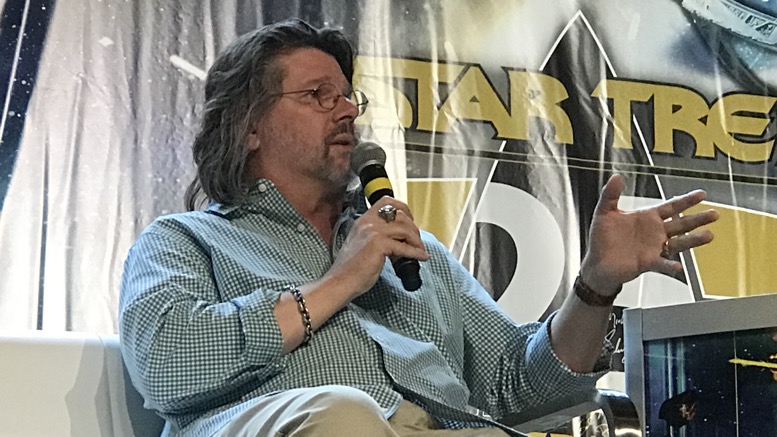
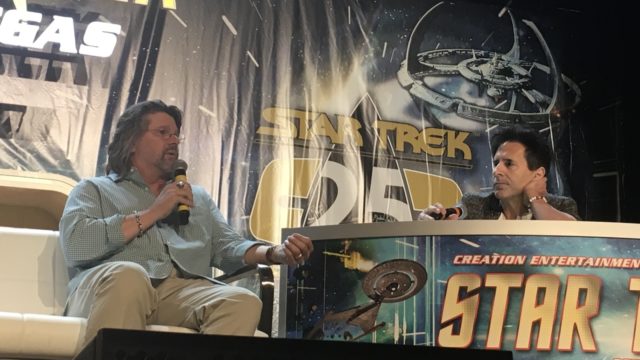
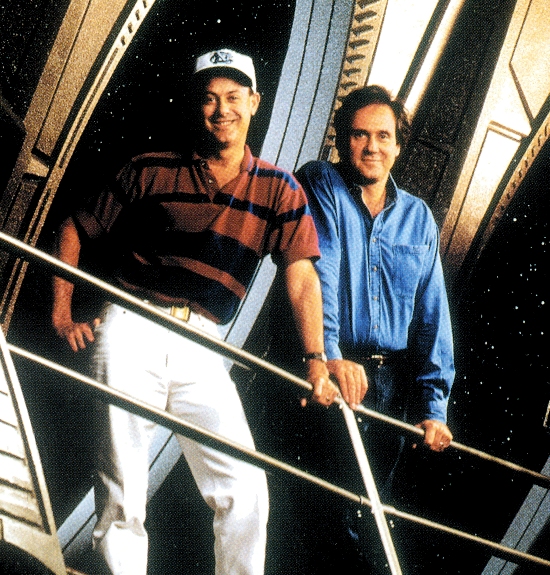
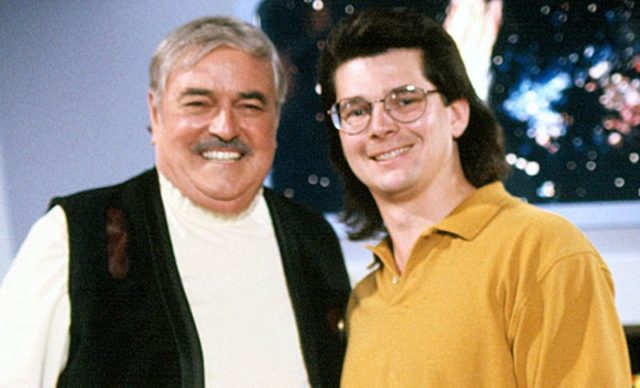
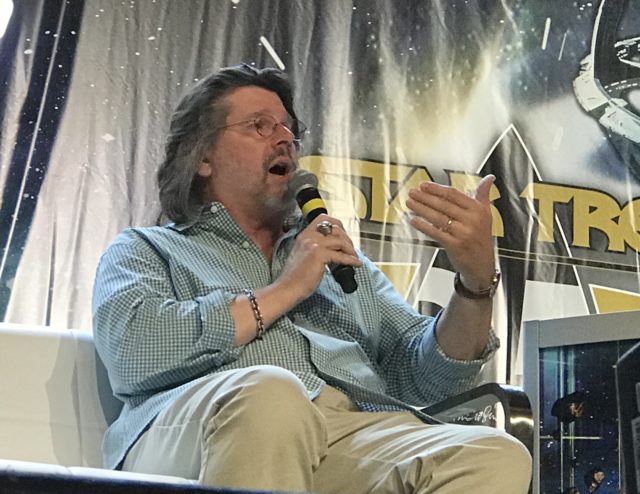
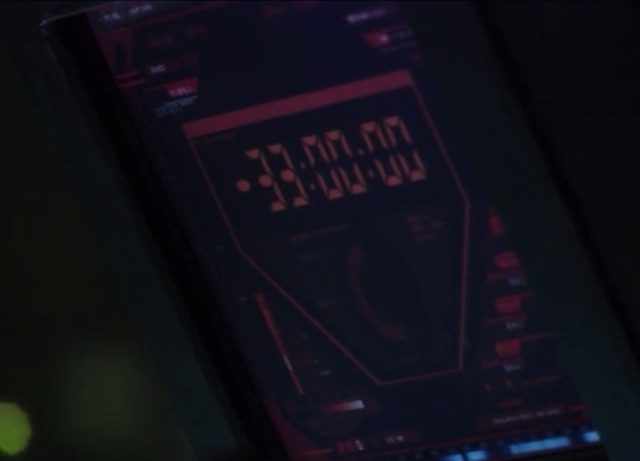
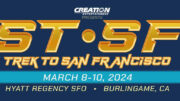
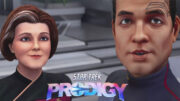

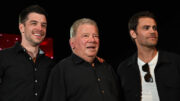
Always liked Moore as a writer
33 is such an incredible episode
Agreed.
It is one of my favorite episodes.
I love Ron Moore. If there was anyone I would love to do the Picard show it would be him in an instant.
And I agree with him about the fatigue issue. People weren’t tired of Trek, they were just tired of that style of Trek, which was true. But it went on for 18 years, you will get sick of anything that went on that long lol. So its nothing wrong to give it a little break and reinvent it. It doesn’t mean it will be good but yeah change it up a bit. DS9 did that but Voyager and Enterprise stuck to more traditional story telling of TOS and TNG.
And that is the one thing I give DIS points on because it’s clear they are trying to make it feel different and not the same routine as the others. But the other problem is how it was executed just wasn’t very good either IMO. Different is always good but isn’t always better either and that’s the rub with DIS for me. They may have taken it too far in some places. ;)
But I think if they make the shows vastly different from each other and put them in different time eras (Post-TUC, 24th-25th century, etc), settings, don’t have them all taking place on starships, etc they can do a wide range of shows. The Khan show in all honesty is sticking to that ideal but people hate it because it just feels like nostalgia sake. But I would be fine with a show where Starfleet officers stayed on one planet and built a new colony or something.
Star Trek is such a BIG idea you can do anything with it. That’s what is so great about it. Don’t just think small all the time or more fan service. We don’t need the next show where someone else is related to someone on the Enterprise. People just love the concept so think big!
@Tiger2 And the Picard show doesn’t feel like nostalgia sake to you?
It is the weaponization of white nostalgia so as to redress the grievances of white fragility, full stop.
Oh Lord.
This is utter nonsense.
that is every single one of his posts.
Well, I think we found the liberal arts major.
Or it’s just a new series featuring Picard to give All Access the shot in the armor it needs. With 2.5 million subscribers, Discovery isn’t enough.
^Yep!
If Discovery pulled in what they hoped we probably wouldn’t be having this conversation. They need something big to shake up the universe and get people interested in Trek again.
Enough with the anti-white racism.
Um, riigghhtt…
I agree with you regarding kudos to the STD people for wanting to do something kinda different. But just because it is different doesn’t mean it will still be good. I don’t think nostalgia is the reason for indifference towards a Khan show. I think it’s because it’s a storyline many don’t really find all that intriguing. If it were because it was just nostalgia for nostalgia sake the Picard show would be met with the same indifference. OK, a bit better received. But it still would not be as widely anticipated as it currently is at all if that were the case.
No I agree completely about Khan of course. The idea of a show set on Seti Alpha V bore me to tears just thinking about it.
But what I mean about nostalgia sake is that a Khan show could represent one of the worst concepts about prequels and just tun into another Solo and literally fill out the details to things we already know. A lot of call backs to stuff (‘Hey remember when Khan said he lost his wife, well now we get to see what happened!!!! Cool huh???’). That’s what bugged me about Solo, not the fact that they did it, but that they ALWAYS did it. Every five minutes of that movie felt like some easter egg or call back to something we learned about him from the other films. It was always ‘this is how he got his blaster, this is how he won the Falcon in the card game, this is how he became a scoundrel, this is how he got the gold dice, this is how he made kessel run, this is how he got his name (you didn’t even know you were getting that did you? BONUS ROUND!!!)’ and on and on and on.
And I liked the film, but it was waaaaay too much of it and it stretched belief after awhile because you have to believe most of these things happened in one week of his life. That’s my fear of what Khan would be and because we ALREADY know about his life its just there to reaffirm everything we already learned. That’s not telling a story to me, so much as its just connecting dots in a story.
The Picard show is a different thing in the sense its a continuation of a character. EVERYTHING we will learn about him will be new because it hasn’t been told before. This is why going forward is just more exciting. Yes we know who Picard is and we are well familiar with his exploits and yet everything about him post Nemesis is a complete blank slate. It doesn’t mean it will be good lol but it will at least be different and new. This is nothing like Khan, we know exactly how that character’s life turned out. Someone seems to think we want it retold to us because of how cool and popular Khan is. Remember, Solo was a cool and popular character too. ;)
Interesting to see RDM’s view on social media. He engaged fans in social media before it was a thing. His Q&A in the AOL forums which later moved to Q&A on the very early Trekweb (1996).
I used to listen to his BSG commentaries back in the day.
Yes,I engaged with him often on the “ Ask Ron Moore” boards on AOL back in the 90s. He was even accessible via IM as was Brannon Braga. But to his credit, he never altered his stories based on fan input, he just enjoyed answering questions about the show. We also talked about other things like history, astronomy, and Melrose Place, lol. I learned a lot about TV production from him
He is not criticizing social media but criticizing how writers allow it to alter their process. He has always used it for interaction with fans but usually as a Q&A forum, not as a way to gauge what fans want.
I loved the “Ask Ron Moore” board on AOL. Those were some good times. Were they archived anywhere?
I loved the “Ask Ron Moore” board on AOL. Those were some good times. Were they archived anywhere?
Perhaps the most interesting thing he said had to do with the impact of social media compared to the “real audience”. With this in mind, I think writers of Disco have a very difficult job – perhaps paying attention to SOME of the complaints while they completely ignoring others. As he said, this isn’t a democracy. The “firewall” idea certainly has some merit so maybe the easiest thing to do is to hire talented, smart, creative writers with Trek knowledge, shield them from the plethora of social media opinions and trust them to properly steer the franchise into the future. Of course, we will still post comments both positive and negative just because it is fun and occasionally maybe the producers can pass something legit and valuable onto the writers room.
@DeanH — well one thing’s for sure, TOS was free from the influence of social media. Ratings were the only kind of feedback that writers got. If a show had good ratings then writers could give the audiences more of “that”, often guessing at it. By the time TNG came around, Trek fans were solidly organized, and even if social media was still decades away, their views were reflected solidly in print, and Trek has notably suffered ever since, at times becoming an echo chamber of fans desires being funneled on screen often at the expense of story.
was it? “social media” of the day would’ve been written correspondence, which is what saved TOS and got a season 3. it’s all relative my friend.
Yeah, it is hard to decipher the useful comments from those better left alone. In the end, I think it is best to leave the writing in the hands of those with creative talent who are paid to come up with innovative stories. Just look at the new Picard series. The writing team is obviously talented but there are already naysayers out there and the scripts haven’t even been written yet. Best to live behind the firewall!!
Loved his work on Star Trek. BSG, OTOH, is a very mixed bag for me. The seasons leading up to the colony planet were great. After that, not so much. The series, as a whole, is just was waaaay too dark – so much so that I find I have zero interest in watching that show again. It’s depressing, and the jerky camera work did not hold up well (as in, I find it very distracting/annoying).
DS9 is the exact opposite. I’ve watched that series, from first episode to last, at least 4-5 times now. And every time, it’s thoroughly enjoyable (minus the Sisko as prophet ending deal).
BSG is supremely depressing indeed, but still some of the best drama put to tape.
Fatigue comes from going into a movie/episode knowing the quotes/bits rather than coming away with fresh ones.
If all Trek is is a neck pinch, “highly illogical,” a phaser, and a tribble, I’ll pass. Let’s boldly go to new situations!
If I had a chance, I’d ask him about the “Equinox” episodes in VOY, which seem to have been the first incarnation of story elements that he reused in BSG in the Pegasus arc. The relationship of VOY to Equinox is basically the same as that of the Galactica to the Pegasus, in terms of the different attitudes of the two ships’ captains and crews. Also, if memory serves, he uses “Good hunting” in the Equinox episodes, too, a phrase which of course became a staple of BSG.
That’s true but isn’t the Pegasus storyline also a revamp from the original series? I can see how he married the two story elements
albatrosity
Yup, the Pegasus was in the original BSG, but it didn’t have the malevolent-vigilante theme associated with it. He added that theme with the Equinox and then applied it to the Pegasus for his BSG reimagining.
Piller’s writing room for TNG (along with TWOK script being a greatest hits compiled from previous independent scripts) is another good example of how having a broader pool of writers yields richer writing.
Thank you Ronald D. Moore….not only for your significant writing contributions to Star Trek TNG, BSG and more, but for being brave enough to continuously rock the mullet into 2018.
Best comment.
Love his points about social media. Art is not by committee. Writers should write good stories and hope that the fans appreciate it. That’s all you can ask of them. To do anything else, e.g. being held captive by virulent fans screaming on social media, and they would lose all credibility as an artist.
So, “The Orville” is a tribute to Trek franchise fatigue.
Any time their crappy show they slapped the moniker “Star Trek” on bombs, it’s back to the good old “franchise fatigue” argument. If you make a show that is actually good, well written, interesting character development (instead of the idiotic virtue signalling), your franchise might not get “fatigued”.
Greatest TV writer, given his excellent work on “Deep Space Nine” and “Battlestar Galactica.” I even enjoy “Outlander”, though not nearly as much.
I agree with him regarding Franchise Fatigue. Just that I think it set in upon the conclusion of Voyager. I do think Enterprise, while similar, was different enough to set that title aside. But still think it would have been a wise move to go one or two years before starting it.
If one man deserves a call up into the Star Trek fold, it’s Ronald D. Moore. I’m not sure if he’d be interested, but he would be a perfect candidate to join in with the writers in the New Picard show.
Fresh talent is extremely important I know, but one or two old faces may inject just a little bit of familiarity needed to entice back older fans.
But he’s already committed to another show. And I think one thing CBS learned with the Fuller debacle, you want someone who is going to be around full time, especially at the beginning of these shows and not when they are making several others.